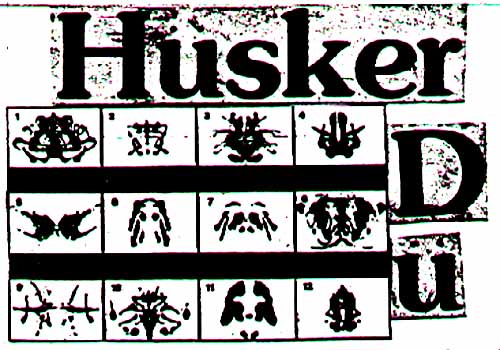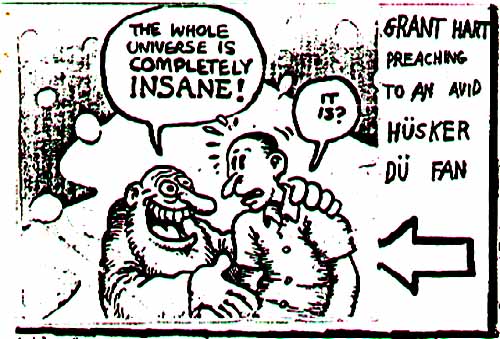
Smash!: Yeah, there's a good diversity.
Bob: We like these kind of crowds though. This looks like it's going to be a great show. (commenting on the crowd that came to see them play with Proletariat and Sorry).
Smash!: This is a big crowd.
Bob: Yeah, this is a massive turnout for an all-ages show. This is really cool. Minneapolis is sort of not happening with an underage thing yet.
Smash!: Do you notice any major difference in scenes, going from city to city?
Grant: What kind of differences?
Smash!: Differences in like dancing, or styles, or people, atmosphere, attitudes.
Bob: The scenes that don't get a lot of attention seem to be a lot more honest, in general, and they're a lot more earnest. Smaller cities like your Tulsas and your Dallases and...
Grant: Your Normans.
Bob: Norman, Oklahoma. Stuff like that. Cincinnati. They just seem to be into it really for the music. Like, Boston, DC, LA and San Francisco are, like, you know, everyone seems to know what happened in each one, and stuff. And, you know, I think some people try to live up to it in a way. Like the "New York attitude."
Grant: Not only do the people themselves try to live up to it, but newcomers to the scene also.
Bob: Yeah, that's the problem with a real big scene. It's like the rules have been set, even though there's not supposed to be any. You know, like the "social etiquette."
Grant: "I hear they do balcony dives over there."
Bob: Yeah, it's like "I hear they do" this, or "I hear they do" that. "I hear they eat tables," so you see people like over chomping on a table.
Smash!: What does "Hüsker Dü" mean?
Bob: It's Danish or Swedish for "Do you remember?" I guess it can mean "Can you remember?" It used to be a kids game in the sixties. A board game — have you ever seen it, "Husker Du?"
Smash!: No.
Bob: A kid's game where the child can outwit the adult. That's where we got the name from.
Grant: Yes, you got this set of 36 checkers, and there's 18 different symbols, two of each, and you like pick up and try to match them.
Bob: Like "Concentration," and you keep going in circles.
Grant: Somebody told me that they play it with quarters, so you got like 18 bucks sitting on the board.
Bob: Yeah, you can keep your chips.
Grant: Well, nine bucks.
Bob: So you gotta be good.
Smash!: Is the symbol from that?
Bob: No, no, that we designed ourselves. Pretty much our corporate logo. (laughter)
Smash!: Do you get mainly a hardcore audience?
Bob: No. Uh, maybe out here the first time, but when we play out on the West Coast we attract a really diverse crowd. We do mainly hardcore shows, but we have a strong crossover with people who are into other kinds of music.
Smash!: Yeah, you had people here who were into, like, you know, Mission of Burma?
Bob: Yeah.
Smash!: That type of music.
Bob: Yeah, the more experimental, edgy type stuff. You know, I like hardcore. It's real fun, you know, kids thrashing and all that, but I'd like other people to come too. I wish everybody could have a chance to listen to us, and then decide whether they like it or not. I think, you know, when a band is called "hardcore," it turns a lot of people off. It makes it real exclusive, and shuts off a potential listening audience, in a way. I think that's not real good for as band like us, who has a lot of song material to listen to.
